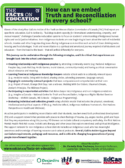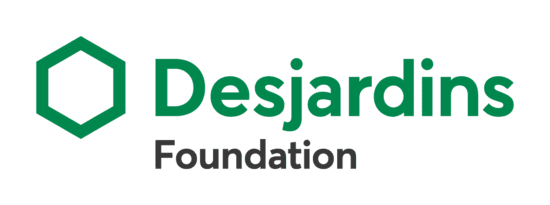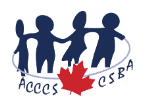How can we embed Truth and Reconciliation in every school?
Changing how generations of young people move forward together.
Eleven of the ninety-four Calls to Action of the Truth and Reconciliation Commission of Canada (TRC) final report are specific to education. Call to Action 63, “Building student capacity for intercultural understanding, empathy, and mutual respect,” challenges Canadian education systems to focus on students’ understanding of Indigenous human rights and social justice initiatives. Non-Indigenous students are now beginning to learn about the truth of residential schools, treaties and other long-standing issues facing Indigenous communities such as lack of clean drinking water, housing and food shortages. Truth and reconciliation is a spiritual and emotional journey required of all students and educators – from the head to the heart – that will unfold differently for everyone.
This journey can be undertaken through the following strategies, and It is critical that experiences are brought back into the school and classroom:
- Creating relationships with Indigenous peoples by attending community events (e.g. National Indigenous Peoples Day, Louis Riel Day, Arctic Games, round dances, community meals) and having a critical conversation about relevance and meaning.
- Learning from local Indigenous Knowledge Keepers outside school walls in a culturally relevant space (e.g. medicine walks, living with the land, sharing circles, attending powwows, language camps).
- Engaging in community outreach projects that have compassion and comprehension at their core (e.g. Project of Heart, Orange Shirt Day, I am a witness, Walking With Our Sisters, Shannen’s Dream, Jordan’s Principle, The REDress Project).
- Participating in experiential activities that delve deeper into Indigenous and non-Indigenous relations (e.g. Imagine a Canada – National Centre for Truth and Reconciliation, Indigenous Rights Blanket Exercise Workshop – KAIROS Canada, WE Schools – Indigenous Programming).
- Evaluating individual and collective growth using a holistic model that includes the physical, emotional, intellectual and spiritual aspects of life (e.g. Medicine Wheel, Indigenous Wellness Framework, First Nations Perspective on Health and Wellness).
As active participants in modelling reconciliation with their students, teachers need both professional development (PD) and a support network that provides safe places to share feelings of trauma, joy, anger, resolve, grief, and hope that they may experience along this journey. PD themes can include cultural competency and safety, the First Nations Mental Health First Aid course, holistic arts therapy and other areas that explore emotional and spiritual intelligence. The support network for non-Indigenous school districts includes an Indigenous Lead, who has meaningful awareness and knowledge of learning resources and cultural protocols.
Overall, Call to Action 63 goes beyond curriculum requirements, pedagogy and resources, and it is critical to changing how generations of young people move forward together.
Additional Information Resources
Events and initiatives
- South Slave Arctic Winter Games (2018). Arctic Winter Games.
- Carleton University – Centre for Indigenous Initiatives (2018). Round Dance.
- Orange Shirt Society (2018). The Story of Orange Shirt Day.
- Project of Heart. (2018). Project of Heart – Home.
- Walking With Our Sisters (2017). A Commemorative Art Installation for the Missing and Murdered Indigenous Women of Canada and the United States.
- First Nations Child & Family Caring Society (2018). Shannen’s Dream.
- The REDress Project (2014). About – Artist Statement.
- KAIROS Canada (2018). Reconciliation through Education and Understanding – The KAIROS Blanket Exercise.
- WE Charity. (2018). Indigenous Programming.
Articles
- Bell, Nicole. Teaching by the Medicine Wheel. EdCan Network (2014).
- Toulouse, P. (2018). Truth and Reconciliation in Canadian Schools. Winnipeg, MB: Portage and Main Press.
Resources and history
- Government of Canada (2018). National Indigenous Peoples Day.
- Métis Nation of Ontario (2016). Louis Riel Day.
- First Nations Child & Family Caring Society (2018). I am a witness.
- Government of Canada (2018). Jordan’s Principle.
- National Centre for Truth and Reconciliation. (2018). Residential Schools and Reconciliation Educational Resources.
- First Nations Health Authority. (2018). Indigenous Wellness Framework.
- Mental Health Commission of Canada (2018). Mental Health First Aid First Nations.
References
Czyzewski, Karina. “The Truth and Reconciliation Commission of Canada: Insights into the goal of transformative education.” International Indigenous Policy Journal 2, no. 3 (2011).
McCarty, Teresa, and Tiffany Lee. “Critical culturally sustaining/revitalizing pedagogy and Indigenous education sovereignty.” Harvard Educational Review 84, no. 1 (2014): 101-124.
Nagy, Rosemary. “The Truth and Reconciliation Commission of Canada: Genesis and Design1.” Canadian Journal of Law & Society/La Revue Canadienne Droit et Société 29, no. 2 (2014): 199-217.
Savage, Catherine, Rawiri Hindle, Luanna H. Meyer, Anne Hynds, Wally Penetito, and Christine E. Sleeter. “Culturally responsive pedagogies in the classroom: Indigenous student experiences across the curriculum.” Asia-Pacific Journal of Teacher Education 39, no. 3 (2011): 183-198.
Truth and Reconciliation Commission of Canada. (2015). Honouring the Truth, Reconciling for the Future – Summary of the Final Report of the Truth and Reconciliation of Canada. Winnipeg, MB: Same as Author.



